
Alphabetical Menu
Chronological Menu
|
Cloudy Mountain 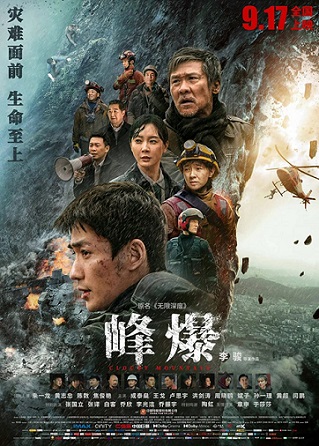 Yizhou (Zhu Yilong) works with his girlfriend, Yajun (Chen Shu), on a dangerous construction project to build a railroad through Yudang Mountain in China. His estranged father, Yunbing (Huang Zhi-Zhong), a former railway soldier, wants to reunite with him, but Yizhou isn't excited to reconcile with him. Disaster strikes when earthquakes and landslides occur and trap people inside an underground cave. Yunbing and his son join together fighting for their lives as they try to rescue the people trapped in the cave. Meanwhile, Ding Yajun (Su Chen), cares more about completing the project than about safety and saving people's lives. Cloudy Mountain is a blockbuster that has just the right balance of truth and spectacle. The true villain in the screenplay by writer/director Li Jun and co-writer Sha Song isn't a human being, but rather mother nature. Although this is indeed a disaster film with action and thrills, it never forgets to treat its characters like human beings and to develop their relationships. Therefore, when disaster strikes, you actually care about them and remain emotionally invested in their lives. It's also worth mentioning that Cloudy Mountain is superior to Dante Lam's The Rescue because it only has a few subplots while staying focused on the main plot of the rescue itself. The Rescue, on the other hand, feels like four or five movies all at once with clunky drama, cheesy romance, action and thrills all at once. The drama in Cloudy Mountain doesn't feel clunky. There are many characters, yet the film never feels overstuffed or unfocused. The father-son relationship provides the most poignant moments without tugging at your heartstrings too much. Although the answer to whether or not Yizhou and his father will end up reconciling isn't very surprising, this film isn't all about surprising the audience. It's about human relationships which is something that's not usually expected from a blockbuster. Kudos to the filmmakers for keeping Cloudy Mountain grounded in realism. The action scenes and visual effects are superb. There are just enough action scenes without making you feel exhausted, but they do feel quite intense at times. Tedium could've easily set in around the hour mark, but the filmmakers don't allow that to happen because there's just the right balance of action and drama. Also, the performances are decent; this isn't anything like the Stallone film Daylight or a Michael Bay film where everyone looks sexy and everything shot like it were a music video or a video game. If The Rescue is more like a Michael Bay film like Armageddon, Cloudy Mountain is the equivalent of the more grounded Deep Impact. At a running time of just under 2 hours, Cloudy Mountain manages to be gripping, thrilling and refreshingly heartfelt.
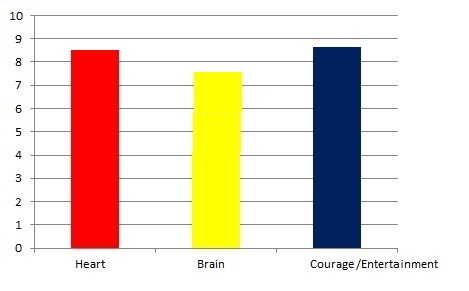 Dune: Part One  In the year 10191 on the planet of Arrakis, the Harkonnen harvest a unique spice used for travelling between stars. Duke Leto (Oscar Isaac) lives on the planet of Caladan with his concubine, Lady Jessica (Rebecca Ferguson) and son, Paul Atreides (Timothée Chalamet). They travel to Arrakis so that Duke Leto can take control over the mining operations of the spice, but the nefarious Baron Vladimir Harkonnen (Stellan Skarsgård) poses a threat to him and his family. Based on the novel by Frank Herbert, Dune: Part One is essentially one long setup for Part Two with very little payoff. The screenplay by Jon Spaihts, Eric Roth and writer/director Denis Villeneuve takes a while to introduce all of the characters, some of them more briefly than others, and to explain motivations. Paul has special powers that allow him to see into the future. He has visions of Chani (Zendaya). His mother encourages him to hone his mind control skills despite the disapproval of Reverend Mother Mohiam (Charlotte Rampling). There are simply too many characters and lots of exposition, much of which feels dry with too little comic relief or wit. It's also anticlimactic more often than not. The film seems like it's merely going through the motions without adding much depth or delving into the mind of its characters, especially Paul who remains at a cold distance from the audience. That makes it hard to root for him or to care about him. There's not enough of a window into his heart, mind and soul despite a few scenes attempting to be poignant, but result in clunkiness and unneveness. Dune: Part One works best as a spectacle of sight and sounds with great makeup design by the talented Donald Mowat. Everything from the sound design to the cinematography and music score add plenty of style and even a little substance. Seeing it all on the big screen, especially in IMAX, would be ideal. It's too bad, though, that the film doesn't quite match the exhilaration of The Lord of the Rings. Even the first film in that series felt thrilling and gripping, not just breathtaking on an aesthetic level. Dune: Part One tries hard to please the audience on a shallow level and occasionally succeeds with some awe-inspiring scenes, but for the most part, it comes with diminishing returns. A truly great film should have a perfect blend of Truth and Spectacle, as Francois Truffaut once wisely observed. The Lord of the Rings manages to have both as it found Truth within all of the Spectacle. Dune: Part One has too much Spectacle and not nearly enough Truth, on the other hand. Timothée Chalamet, Rebecca Furgison and Oscar Isaac try their best to add a little emotional depth, but they're still undermined by the shallow screenplay. Sometimes Spectacle alone can be a lot of fun, but that's not the case here. Too many scenes drag, especially after the 90-minute mark. At a running time of 2 hour and 35 minutes, Dune: Part One is a visually stunning, well-produced Spectacle, but it's overlong, anticlimactic and often dull. 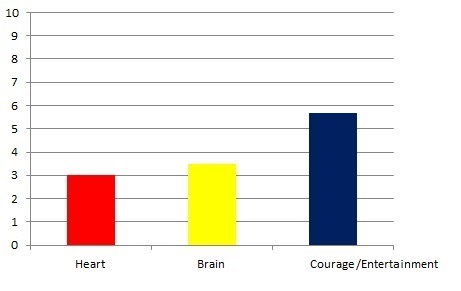 The Estate  George (Chris Baker) lives with his billionaire dad, Marcello (Eric Roberts), and stepmother, Lux (Eliza Coupe), in a mansion. He and Lux hire a hitman, Joe (Greg Finley), to kill his father so that they can get rich from their inheritance. The Estate doesn't work as a satire nor as a crime thriller. The screenplay by Chris Baker doesn't take itself too seriously at least, so there are no subplots that veer into schmaltz or melodrama. Unfortunately, there's not enough wit or dark comedy, and the twists, which won't be spoiled here, can be seen from a mile away, so they're not very surprising, especially when it comes to the motivations of Joe. It doesn't help that not a single character can be trusted because they're all selfish, vapid and shallow which makes them far from good role models and, therefore, hard to root for. They're over-the-top caricatures which would've been fine if the film were funnier, bolder and campier. Instead, they all become increasingly grating and unpleasant like nails on a chalkboard. More backstory would've humanized them, but director James Kapner and screenwriter Chris Baker don't seem very interested in doing that. George, Lux and Joe aren't very bright, either. Why do George and Lux go to the estate lawyer of George's father without hiring a lawyer themselves to represent them and look over the legal paperwork? The estate lawyer does not represent either of them, so why should they even trust the estate lawyer? The third act takes a steep nosedive as the violence escalates as do the twists, but it still doesn't make The Estate any more fun, thrilling or suspenseful. For a more clever, witty, funny, sexy and biting crime thriller that satirizes the rich with a twist plot, see the far superior, underrated 2 Days in the Valley starring the charismatic Danny Aiello as a hitman with a heart of gold. Charisma is yet another strength that's missing in The Estate. If any of the actors were able to exude charisma, it would've made the film rise above its inane, lifeless screenplay. A hint of that much-needed liveliness and charisma can be seen in the performance of Heather Matarazzo who shows up too briefly early on before the plot requires her character to return later on briefly, yet again. On a positive note, the set design and cinematography are both stylish. Sometimes style can become a part of a film's substance, but not in this case. At a running time of 1 hour and 25 minutes, The Estate is slick and stylish, but toothless, unfunny and, much like its characters, vapid.
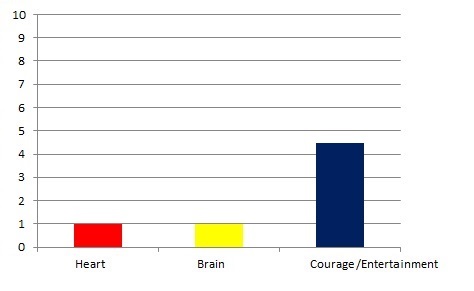 The French Dispatch 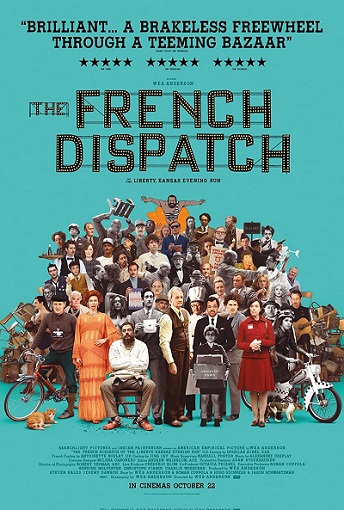 Journalists from The French Dispatch, a Kansas magazine based in Ennui-sur-Blasé, France, write four short stories to commemorate their editor, Arthur Howitzer, Jr. (Bill Murray), who died. The magazine's staff include Herbsaint Sazerac (Owen Wilson), J.K.L. Berensen (Tilda Swinton), Lucinda Krementz (Frances McDormand), and Roebuck Wright (Jeffrey Wright), among others like the cartoonist (Jason Schwartzman) and copy editor (copy editor (Elisabeth Moss). The French Dispatch is essentially an anthology of four short stories with a wrap-around story involving the death of a beloved magazine editor. In the first story, a painter, Moses Rosenthaler (Benicio Del Toro), incarcerated in an asylum paints a prison guard, Simone (Léa Seydoux) nude and soon gets an offer from an art dealer, Julien Cadazio (Adrien Brody) for his paintings. In the next story, a student, Zeffirelli B. (Timothée Chalamet), sleeps with an older woman, Lucinda (Frances McDormand) who helps him to write a manifesto. In the third story, a TV host, Liev Schreiber, interviews Roebuck Wright about an article he wrote about Lieutenant Nescaffier (Stephen Park), the personal chef of a police commissioner (Mathieu Amalric). In the final vignette, The French Dispatch's staff gather to write an obituary for their editor. None of the stories stands out per se, but they're each certainly very different. The third story is the most dull and convoluted one among all of them. Writer/director Wes Anderson bombards the audience with too many characters none of whom are memorable. Did I mention that Willem Dafoe, Bob Balaban and Lois Smith are also in the film? Angelica Houston provides the voice-over narration. Despite so many actors and four vignettes, there's very little depth, warmth, wit or laughs for that matter. Wes Anderson tries too hard to please the audience, but doesn't quite succeed this time around. There's plenty of Wes Anderson's trademark whimsy, though, but it's not nearly as refreshing as it felt in Rushmore or The Royal Tenenbaums. When it comes to cinematography, set design and costume design, The French Dispatch excels which is what you would expect from a Wes Anderson film. He plays around with aspect ratios and black-and-white cinematography that adds plenty of visual style. Stylish visuals can only go so far, though. What about entertainment? Emotional depth? Insights? Perhaps The French Dispatch would work better as a movie to study in film school scene-by-scene rather than with an audience at a movie theater. At a running time of 1 hour and 48 minutes, it's too bad that The French Dispatch is ultimately less than the sum of its parts. 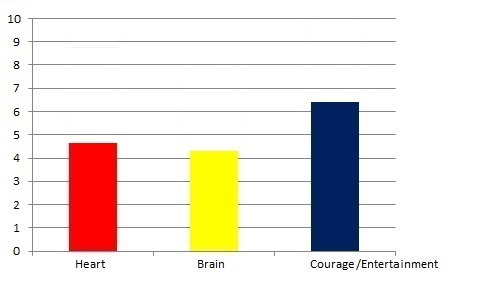 The Laws of the Universe: The Age of Elohim 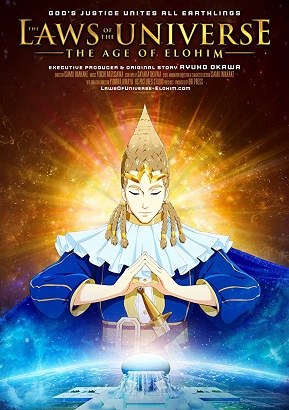 Yaizael (voice of Fumika Shimizu) from planet Vega stops a meteorite from striking planet Earth where the god known as Elohim rules. It turns out that it was an act of war by Evol (voice of Satoshi Tsuruoka), the military leader of the Centaurus Beta, and the nefarious alien Dahar (Ayumu Murase). Michael (voice of Hiroki Takahashi) and his twin brother, Lucifer (voice of Jun Kasama), join Yaizael, among others, to defend against Evol's army who seek to destroy planet Earth. The screenplay by Sayaka Okawa combines sci-fi elements with some action, intrigue and thought-provoking messages such as tolerance. There's just the right amount of exposition for the audience to be able to follow the plot and understand who's who without being confused. Although the plot is pretty simple, it doesn't become shallow or tedious. At times, some of the dialogue does veer toward preachines, but that's forgivable because it's full of wisdom and truth. This is the kind of movie that has both Truth and Spectacle, unlike the live-action Dune which has too much Spectacle and feels anticlimactic. The Laws of the Universe: The Age of Elohim, on the other hand, is far from anticlimactic. It rewards the audience with rousing action scenes while providing them with messages about Earth to ponder about. Even though the story takes place 150 million years ago, what it has to say about positive virtues, especially regarding combat, are timeless, profoundly human and therefore easy to connect to on an emotional and intellectual level. Aesthetically, the animation looks dazzling and spectacular with many breathtaking sights. Hand-drawn animation almost always looks and feels warmer than CGI which is the case with The Laws of the Universe: The Age of Elohim. Fortunately, the action scenes aren't excessive, so they don't become exhausting. It's also worth mentioning the use of music and, particularly, a few musical numbers which help to invigorate the film. Director Isamu Imakake moves the film at just the right pace without any scenes that overstay their welcome. He and screenwriter Sayaka Okawa grasp the importance of not only providing the audience with a feast for their eyes and ears, but also for their heart, mind and soul. In other words, they know how to treat the audience like human beings which makes them kindred spirits with Hayao Miyazaki. At a running time of 2 hours, The Laws of the Universe: The Age of Elohim is exhilarating, profound and rousing with just the right balance of Truth and Spectacle. It's the perfect antidote to Denis Villeneuve's overlong, dull and anti-climactic Dune. 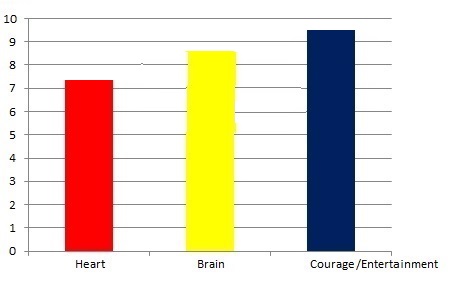 Minyan 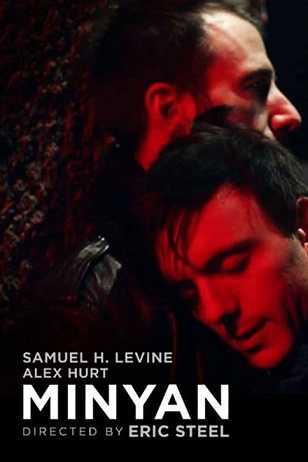 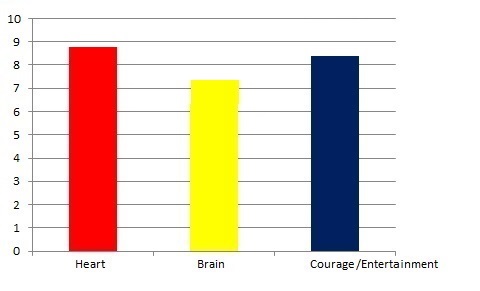 Ron's Gone Wrong 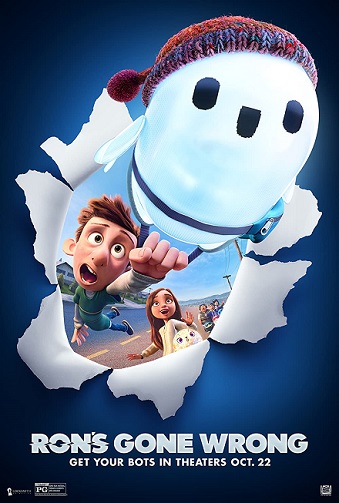
Barney (voice of Jack Dylan Grazer), a shy middle school student, gets bullied at school where all of his classmates have their own personal robot called a B-Bot which he desperately wants, but his father, Dad (voice Ed Helms), isn't a big fan of those inventions. He ends up buying him a cheap one that fell off a truck after noticing that no one came to his birthday party. The B-Bot, which Barney names Ron, often malfunctions, though, but still learns new things like how to become Barney's friend and defend him against his school bullies. The screenplay by Peter Baynham and writer/director Sarah Smith tries to be thrilling, funny and heartfelt while tackling important issues like bullying, but the beats don't quite land. Some of the attempts at humor are either silly or uninspired. The villain, Andrew (voice of Rob Delaney), a co-founder of Bubble, the company that makes B-Bots, comes across more as a caricature than anything else. He makes for a pretty boring villain. Even the villains in other animated films had a backstory that humanized them. The filmmakers don't seem really interested in accomplishing humanization. They take a rather black-and-white approach to bullying with a solution to fight back against the bully in retaliation which sends the wrong message. Both Barney and Ron are outsiders in a way, so it's expected that they bond, but that friendship never really feels palpable nor does the film really delve into the meaning of friendship for that matter. What is Ron's Gone Wrong trying to say about technology? At times it seems damaging and harmful psychologically and emotionally, but then the ending, which won't be spoiled here, contradicts that and cops-out. The third act takes a nosedive because of that contradiction and how rushed it feels. Do the filmmakers want to leave it up to the audience to decide what to feel about technology? Either way, the film is cowardly for not having the guts to comment on technologic in a more perceptive and biting way like the far superior Wall-E does. Even The Boss Baby: Family Business has more to say about technology while doing a better job at entertaining the audience with its zaniness. Perhaps Ron's Gone Wrong could've used more zaniness or at least something to make it more invigorating. On a positive note, the CGI animation looks great with some objects that even look photorealistic. Clearly, a lot of attention was paid to the animation. The pacing is brisk enough without any scenes that drag. If only the same attention could've been paid to the screenplay, Ron's Gone Wrong could've been fun, clever and thrilling. At a running time of 1 hour and 47 minutes, Ron's Gone Wrong is a mildly engaging, but ultimately underwhelming animated film low on insight, thrills and humor with contradicting messages about technology. 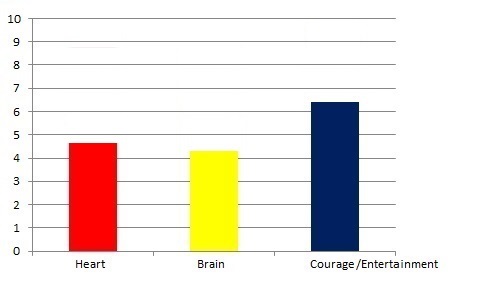 |